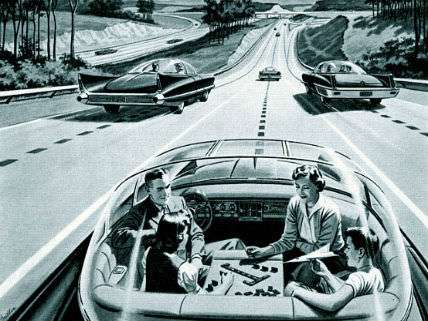Outlawing Human-Driven Cars
Elon Musk predicts "You can't have a person driving a two-ton death machine."

Over at Forbes, contributor Robert Hof reports the predictions made by Tesla and Space-X founder Elon Musk with regard to the future of self-driving automobiles at Nvidia's GPU Technology Conference in San Jose, California. From Forbes:
In a brief interview with Nvidia cofounder and CEO Jen-Hsun Huang at the graphics chipmaker's annual conference for developers, Musk said that artificial intelligence-powered autonomous or self-driving cars will surpass humans' ability to drive safely and avoid obstacles and accidents. "In the distant future, people may outlaw driven cars because it's too dangerous … You can't have a person driving a two-ton death machine."
Fortunately for Tesla and for people who enjoy driving (but unfortunately for all the people killed and injured in auto accidents), that's not likely to happen very soon, by Musk's estimation. That's despite his belief that autonomous cars are "almost a solved problem." Musk, whose Model S uses two Nvidia chips, compared self-driving cars to elevators, which used to have human operators. "The car is just going to be like that. You'll be able to tell your car, go here, go there and it will just do it."
How distant in the future is the advent of self-driving automobiles? Perhaps not that that distant. NVidia released its new PX Drive system using deep learning artificial intelligence earlier this year. USA Today is reporting that NVidia will make its PX Drive system available to automakers in May:
The platform uses two Tegra X1 processors that are the size of thumbnails, yet boast 2.3 teraflops of performance.
"That's enough to weave together data streaming in from 12 camera inputs and enable a wide range of advanced driver assistance features to run simultaneously – including surround view, collision avoidance, pedestrian detection, mirror-less operation, cross-traffic monitoring and driver-state monitoring," writes Shapiro.
Forbes continues:
"A car is essentially software and computers on wheels," said Huang, who noted that Audi has committed to using Drive PX. "The days of dials, knobs, buttons are gone. The future of the car is going to be digital displays. The car is going to be one delightful computer going down the streets." …
Huang said Drive PX will augment ADAS [Advanced Driver Assistance Systems] systems to make autonomous cars a reality. "The big bang of self-driving cars is about to come," he said.
But not right away, to hear Musk tell it. "Where it gets tricky is that open environment around 30-40 miles an hour," he said. "Children playing, bicycles, manhole covers are issues in a suburban environment. Highway cruise is easy, low speed is easy, intermediate is hard." Still, he added, "We know exactly what to do and we'll be there in a few years. We'll take autonomous cars for granted in a short period of time.
I think that Musk is being a bit too cautious and that safe, fully autonomous vehicles will be zipping up and down our roadways before 2020 (if the regulators will get out of the way). For more background see my article, "The Moral Case for Self-Driving Cars."
For those who would resist the "Motor Law" my colleague Brian Doherty suggested that I provide a link to Rush's anthem to highway freedom "Red Barchetta". From the 2011 "Time Machine" Tour:


Show Comments (237)